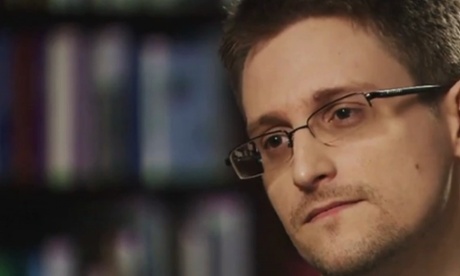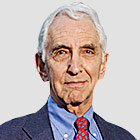Cross-posted from The Guardian
Edward Snowden is the greatest patriot whistleblower of our time, and he knows what I learned more than four decades ago: until the Espionage Act gets reformed, he can never come home safe and receive justice

John Kerry was in my mind Wednesday morning, and not because he had called me a patriot on NBC News. I was reading the lead story in the New York Times -- "US Troops to Leave Afghanistan by End of 2016" -- with a photo of American soldiers looking for caves. I recalled not the Secretary of State but a 27-year-old Kerry, asking, as he testified to the Senate about the US troops who were still in Vietnam and were to remain for another two years: How do you ask a man to be the last man to die for a mistake?
I wondered how a 70-year-old Kerry would relate to that question as he looked at that picture and that headline. And then there he was on MSNBC an hour later, thinking about me, too, during a round of interviews about Afghanistan that inevitably turned to Edward Snowden ahead of my fellow whistleblower's own primetime interview that night:
"There are many a patriot -- you can go back to the Pentagon Papers with Dan Ellsberg and others who stood and went to the court system of America and made their case. Edward Snowden is a coward, he is a traitor, and he has betrayed his country. And if he wants to come home tomorrow to face the music, he can do so."
On the Today show and CBS, Kerry complimented me again -- and said Snowden "should man up and come back to the United States" to face charges. But John Kerry is wrong, because that's not the measure of patriotism when it comes to whistleblowing, for me or Snowden, who is facing the same criminal charges I did for exposing the Pentagon Papers.
As Snowden told Brian Williams on NBC later that night and Snowden's lawyer told me the next morning, he would have no chance whatsoever to come home and make his case -- in public or in court.
Snowden would come back home to a jail cell -- and not just an ordinary cell-block but isolation in solitary confinement, not just for months like Chelsea Manning but for the rest of his sentence, and probably the rest of his life. His legal adviser, Ben Wizner, told me that he estimates Snowden's chance of being allowed out on bail as zero. (I was out on bond, speaking against the Vietnam war, the whole 23 months I was under indictment).
More importantly, the current state of whistleblowing prosecutions under the Espionage Act makes a truly fair trial wholly unavailable to an American who has exposed classified wrongdoing. Legal scholars have strongly argued that the US supreme court -- which has never yet addressed the constitutionality of applying the Espionage Act to leaks to the American public -- should find the use of it overbroad and unconstitutional in the absence of a public interest defense. The Espionage Act, as applied to whistleblowers, violates the First Amendment, is what they're saying.
As I know from my own case, even Snowden's own testimony on the stand would be gagged by government objections and the (arguably unconstitutional) nature of his charges. That was my own experience in court, as the first American to be prosecuted under the Espionage Act -- or any other statute -- for giving information to the American people.
I had looked forward to offering a fuller account in my trial than I had given previously to any journalist -- any Glenn Greenwald or Brian Williams of my time -- as to the considerations that led me to copy and distribute thousands of pages of top-secret documents. I had saved many details until I could present them on the stand, under oath, just as a young John Kerry had delivered his strongest lines in sworn testimony.
But when I finally heard my lawyer ask the prearranged question in direct examination -- Why did you copy the Pentagon Papers? -- I was silenced before I could begin to answer. The government prosecutor objected --irrelevant -- and the judge sustained. My lawyer, exasperated, said he "had never heard of a case where a defendant was not permitted to tell the jury why he did what he did." The judge responded: "well, you're hearing one now."
And so it has been with every subsequent whistleblower under indictment, and so it would be if Edward Snowden was on trial in an American courtroom now.
Indeed, in recent years, the silencing effect of the Espionage Act has only become worse. The other NSA whistleblower prosecuted, Thomas Drake, was barred from uttering the words "whistleblowing" and "overclassification" in his trial. (Thankfully, the Justice Department's case fell apart one day before it was to begin). In the recent case of the State Department contractor Stephen Kim, the presiding judge ruled the prosecution "need not show that the information he allegedly leaked could damage US national security or benefit a foreign power, even potentially."
We saw this entire scenario play out last summer in the trial of Chelsea Manning. The military judge in that case did not let Manning or her lawyer argue her intent, the lack of damage to the US, overclassification of the cables or the benefits of the leaks ... until she was already found guilty.
Without reform to the Espionage Act that lets a court hear a public interest defense -- or a challenge to the appropriateness of government secrecy in each particular case -- Snowden and future Snowdens can and will only be able to "make their case" from outside the United States.
As I know from direct chat-log conversations with him over the past year, Snowden acted in full knowledge of the constitutionally questionable efforts of the Obama administration, in particular, to use the Espionage Act in a way it was never intended by Congress: as the equivalent of a British-type Official Secrets Act criminalizing any and all unauthorized release of classified information. (Congress has repeatedly rejected proposals for such an act as violating the First Amendment protections of free speech and a free press; the one exception to that was vetoed by President Clinton in November 2000, on constitutional grounds.)
(Note: You can view every article as one long page if you sign up as an Advocate Member, or higher).





